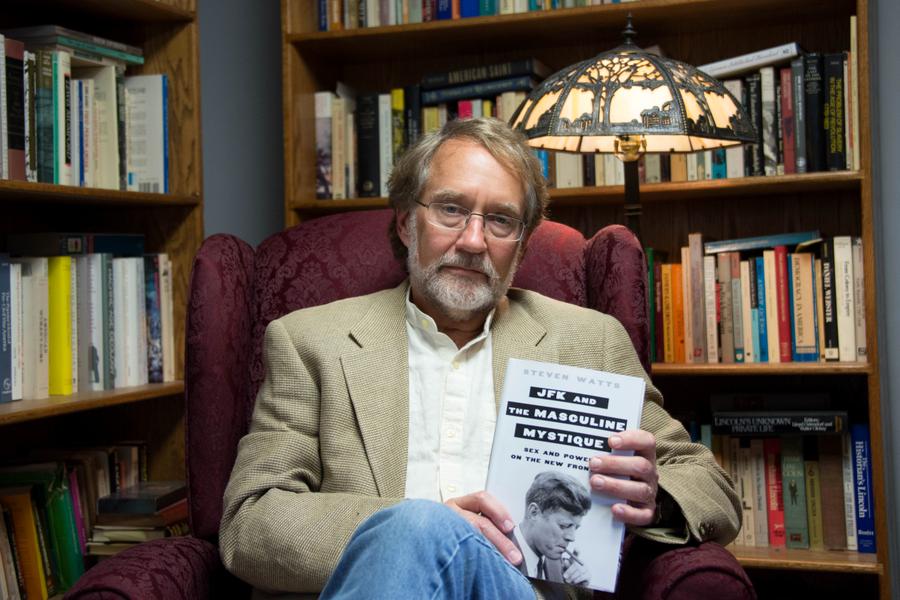
History professor Steven Watts released a new book, “JFK and the Masculine Mystique: Sex and Power on the New Frontier,” on Nov. 8. The book examines how the growing domesticity of men and John F. Kennedy’s cult of personality affected Kennedy’s presidential career.
Watts has been a professor since the late ‘80s and has written other books focusing on important figures in American culture like Walt Disney and Hugh Hefner.
After writing books on mainly cultural figures, Watts wanted to write about a political figure through a cultural lens. Kennedy sprung to his mind.
“Of course there’s a huge number of books written about Kennedy, but what I was really interested in is his popularity,” Watts said. “Because [in] the polls that have been taken of American presidents … he is at the very top of the list in terms of popularity.”
Watts said that after he did some investigation, Kennedy’s politics were not what made him extremely popular, and in many ways, he was a “run-of-the-mill centrist.” Instead, Watts started noticing that magazines and writers in the ’50s and ’60s argued that men were being emasculated by suburban domesticity, consumer comfort and the rise of women in the workplace.
“What I began to discover was that Kennedy, in the public realm, offered a kind of antidote to that great fear of the weakening of American men because he bursts onto the scene as this vibrant, vigorous, handsome young man, a war hero, very cool and sophisticated, very tough-minded as an anti-communist figure,” Watts said.
Watts’ research assistant, Cassandra Yacovazzi, became interested in the project when she realized that this was “not just another biography on JFK.”
“Watts wanted, as he put it, ‘to penetrate the fog of Camelot,’ to really understand the cultural appeal of JFK,” Yacovazzi said. “I think he does that really well in … identifying this crisis of masculinity that preceded Kennedy’s administration and the way in which Kennedy himself embodied this masculine idea and beyond.”
In his book, Watts also looks at how Kennedy’s policies were influenced by his personality.
“For example, I think his anti-communism and the shape that it took with regard to Cuba is very much tied to the James Bond view of the world that Kennedy had,” Watts said.
Watts also studied the ways that Kennedy’s masculine image affected his appeal to the American voters. Beyond just Kennedy’s image, Watts said the people Kennedy surrounded himself with, like Frank Sinatra, Hugh Hefner and Norman Mailer, also led to his “mystique.”
Watts said Kennedy, because of his mystique, was like a Hollywood star. Kennedy’s cult of personality indicated a shift in America’s cultural landscape toward the leader as “celebrity.”
“I think you see that with Ronald Reagan,” Watts said. “I think you see that a little bit with Barack Obama in a same sort of way. And of course with [the recent election] I think you see another version of that as well.”
Yacovazzi also said that the “celebrity” appeal of Kennedy’s administration has become “really embroiled in politics.”
“I think that perhaps rings true for many Americans in the wake of the current election,” Yacovazzi said. “There’s a lot of talk about the influence of reality TV in this election and sound bites. I think we have perhaps gotten away from analyzing individual policies, and we have become more easily caught up in image, celebrity appeal and surface personality.”
Even though the celebrity aspect of politicians remains, Watts said that politicians are no longer mostly supported by ideals of masculinity. In the epilogue of the book, Watts said that the character Don Draper in the TV series “Mad Men” is very comparable to the persona of Kennedy. However, popular perception of Draper seems to suggest that the mystique of Kennedy has faded.
Watts said despite the nostalgic presentation in the show, Draper and society still frequently mistreated women.
“What ends up striking you more is that Draper, that kind of masculine mystique even with that nostalgic pull, really makes us uncomfortable or at least he’s not someone you would want to emulate in the modern world,” Watts said.
Watts said he hopes his book will encourage people to look at politics in a broader scope and examine if their political beliefs are their own or influenced by their culture.
“Having just come from through this political season here, all of us … probably like to think that we are all very rational creatures,” Watts said. “I would like to think it will encourage people to ponder their political positions, and how and why they got there.”
_Edited by Claire Mitzel | [email protected]_